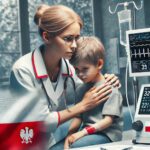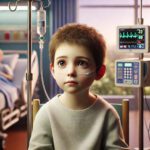Bauskis, A., Strange, C., Molster, C., & Fisher, C. (2022). The diagnostic odyssey: insights from parents of children living with an undiagnosed condition. Orphanet Journal of Rare Diseases, 17(233). https://doi.org/10.1186/s13023-022-02358-x
🔬 The uncertain and challenging journey of families in search of a diagnosis for rare conditions.
- Why it matters: It reveals the difficulties faced by families dealing with rare diseases, underlining the importance of diagnosis in improving quality of life.
🧠 What’s going on:
- Rare diseases affect millions globally, but diagnosis can be a long and complicated process.
- Health professionals’ lack of familiarity with these conditions contributes to diagnostic delays.
🔍 Between the lines:
- Uncertainty and the search for a diagnosis profoundly affect the mental and physical health of families.
- Programs such as the Undiagnosed Diseases Program WA seek to offer hope through genomic advances.
🏃 In a nutshell:
- The search for a diagnosis is a journey full of hopes and obstacles.
- Parents play crucial roles as navigators, experts and advocates for their children.
🖼️ The big picture: Identifying a diagnosis for rare diseases is vital not only for proper treatment and support, but also for connecting families to essential communities and resources. This highlights the need for multidisciplinary approaches and technological advances in health.
💭 O ur opinion Solidarity and innovation are the keys to tackling the diagnostic maze of rare diseases.
The article in questions and answers
What are the main themes that emerged from the interviews with parents of children at the Undiagnosed Diseases Program Western Australia?
The main themes that emerged from the interviews with parents of children in the Western Australian Undiagnosed Diseases Program were:
- The need to respond to the significant care needs of their children, encompassing not only the health system, but also other systems such as education and disability services.
- Parents become the navigators, experts and defenders of their children, taking on a fundamental role in the search for answers and care.
- The diagnostic odyssey, representing the rollercoaster journey towards a diagnosis, including the attribution of various names to the child’s condition and the impact of not having a diagnosis.
- Parents’ views on the value of a diagnosis and the expectations associated with it, highlighting the importance of finding answers to better care for their children.
How do parents navigate the complex systems of healthcare, education, and disability services while seeking a diagnosis for their children?
Parents navigate the complex systems of health, education and disability services while seeking a diagnosis for their children in various ways:
- They become their children’s navigators, experts and advocates, taking responsibility for coordinating care and ensuring that all needs are met.
- Parents share complex information about their child’s health condition with health professionals, often having to explain unusual symptoms and request specific investigations.
- Some parents carry out research on their own, proposing possible diagnoses and investigations to health professionals based on their own analysis and knowledge.
- They seek second opinions and don’t hesitate to look for other sources of information to ensure that they are making the best decisions for their children.
- Many parents report discovering new perspectives on life and experiencing personal growth along this challenging journey, finding strength in family and support groups when available.
What are the implications of not having a diagnosis on the families and the children living with undiagnosed conditions?
The implications of not having a diagnosis on families and children living with undiagnosed conditions include:
- Challenges in care: Families face difficulties in providing adequate care due to a lack of guidance on the treatment and management of the child’s condition.
- Emotional stress: Uncertainty and lack of answers can lead to high levels of emotional stress for parents and children, affecting their mental health and well-being.
- Barriers to access: The absence of a diagnosis can result in difficulties in accessing specialized health services, adequate education and social support, harming the child’s development and quality of life.
- Isolation: The lack of a specific diagnosis can lead to social isolation, as families can feel disconnected from others who share similar experiences.
- Limitations in future planning: Without a clear diagnosis, families may find it difficult to plan for the child’s future, including the education, therapies and support needed to improve their quality of life.
In summary, the lack of a diagnosis can have a significant impact on families and children living with undiagnosed conditions, highlighting the importance of seeking answers and adequate support to improve their quality of life and general well-being.
Bauskis, A., Strange, C., Molster, C., & Fisher, C. (2022). The diagnostic odyssey: insights from parents of children living with an undiagnosed condition. Orphanet Journal of Rare Diseases, 17(233). https://doi.org/10.1186/s13023-022-02358-x
Este post também está disponível em: Português (Portuguese (Brazil))






